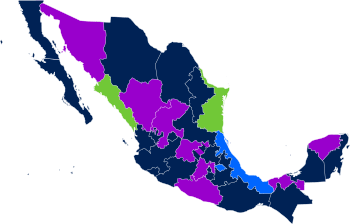Same-sex marriage in Oaxaca
Same-sex marriage is legal in the Mexican state of Oaxaca. A landmark 2012 Supreme Court order for Oaxaca established the right to marriage by amparo (injunction) across the country. On 26 August 2018, following an executive order, the Oaxaca Civil Registry began allowing same-sex couples to marry without the need for an injunction. In August 2019, the Congress of Oaxaca passed legislation codifying this decision into law.
|
Civil unions and registered partnerships
|
||
|
See also
|
||
|
Notes
* Not yet in effect or automatic deadline set by judicial body for same-sex marriage to become legal |
||
|
LGBT portal | ||
History

2012 Supreme Court case
In August 2011, three same-sex couples, four women and two men, applied to be married and were denied by the Civil Registry in Oaxaca City.[1] In January 2012, an injunction was sought, but was denied on 31 January. The couples appealed the judgment to the Collegiate Courts in Civil and Administrative Matters for the State.[1] On 9 April 2012, one of the lesbian couples was granted permission by a judge to marry in Oaxaca, thus becoming the first approval for same-sex marriage in the state. The case was appealed. On 5 December 2012, the three couples won their appeal from the Supreme Court,[1] but local officials refused to perform the marriages. The case returned to the Supreme Court and an additional ruling in favor of the couples was issued. The first lesbian couple received authorization to marry from the Civil Registry on 25 February 2013.[1] They were the first same-sex couple married in Oaxaca and celebrated their marriage on 22 March 2013.[1][2] The male couple received notice of their authorization on 3 June 2013,[1] and the third couple two days later.[3] It was announced in November 2014 that four same-sex couples had married in the state.[1]
On 26 August 2012, a Mexican federal court judge ordered the state of Oaxaca to perform same-sex marriages based on a constitutional amendment which bans discrimination based on sexual orientation. This ruling and two others were reviewed by the Mexican Supreme Court and the Court issued unanimous rulings on 5 December 2012, overturning the ban on same-sex marriage in three individual cases.[4] To establish precedent however, five individual cases must be decided this way.[5]
The 2012 Oaxaca case was pivotal in opening the door to legal same-sex marriage in every state in Mexico, through the injunction (amparo) process. Using international decisions, whose verdicts serve as legal precedent in Mexican courts, like the protections in the American Convention on Human Rights Atala Riffo and Daughters v. Chile case,[6] the U.S. cases Loving v. Virginia and Brown v. Board of Education,[7] and Mexico's own anti-discrimination ordinances, the Court ruled on 5 December 2012 that: 1) Laws limiting marriage to one man and one woman, or for the purposes of perpetuating the species, violate federal law requiring that they "correspond to all persons without any distinction" and 2) That such laws are unconstitutional on the basis of discrimination by sexual orientation and usurpation of the right, not only of the individual but also the couple's right, to form a family.[8] Barring legislative will to change state laws, a provision in the Mexican Code allows that five rulings in a state with the same outcome on the same issue override a statute and establish the legal jurisprudence to overturn it.[9] Thus, marriages obtained by injunction can be performed in any state, regardless of whether the state Civil Code has been changed.[10]
Injunctions
On April 23, 2014, the Mexican Supreme Court set further precedent in the state. The case brought before the Court involved 39 same-sex couples who sought the right to marry.[11] On 5 July 2016, two men won an injunction allowing them to wed.[12]
In July 2017, a same-sex couple was successful in getting married without receiving an injunction.[13]
The first same-sex marriage in Santiago Jamiltepec took place in April 2018.[14] Salina Cruz's first same-sex marriage was performed the following month.[15] Both couples married via injunctions.
Administrative process
On 26 August 2018, following an executive order, the Oaxaca Civil Registry began allowing same-sex couples to marry without the need for an amparo (injunction). However, the process took three business days, compared with two hours for opposite-sex couples.[16][17][18][19]
Legislation
On 28 August 2019, the Congress of Oaxaca passed, in a 25-10 vote, a bill to make the definition of marriage and concubinage in the Civil Code gender-neutral.[20][21][22] It was signed by the Governor on 29 August and published in the official journal on 5 October 2019.[23] Specifically, article 143 of the Civil Code was changed to read:
- in Spanish: El matrimonio es un contrato civil celebrado entre dos personas, que se unen para realizar una vida en común y proporcionarse respeto, igualdad y ayuda mutua.
| Political party | Members | Yes | No | Abstain | Absent |
|---|---|---|---|---|---|
| 26 | 17 | 3 | 4 | 2 | |
| 6 | 4 | 2 | |||
| 3 | 3 | ||||
| 2 | 2 | ||||
| Mujeres Independientes | 2 | 1 | 1 | ||
| 2 | 2 | ||||
| 1 | 1 | ||||
| Total | 42 | 25 | 10 | 4 | 3 |
Public opinion
A 2017 opinion poll conducted by Gabinete de Comunicación Estratégica found that 43% of Oaxaca residents supported same-sex marriage. 55% were opposed.[24]
According to a 2018 survey by the Instituto Nacional de Estadística y Geografía (INEGI), 52% of the Oaxaca public opposed same-sex marriage.[25]
References
- Matrimonio entre personas del mismo sexo. Caso Oaxaca
- "Oaxaca celebra su primera boda gay tras fallo de SCJN", Terra, 28 March 2013
- Suprema Corte avala segundo matrimonio gay en Oaxaca
- "Mexico Supreme Court Rules In Favor Of Marriage Equality". ThinkProgress. 5 December 2012. Retrieved 5 April 2014.
- "Mexican supreme court decision first step in possible path to national gay marriage". Washington Post. 7 December 2012. Retrieved 8 December 2012.
- Mexican Supreme Court rules for marriage equality
- Mexican Supreme Court: American Cases Demand Marriage Equality
- (in Spanish) DECRETO NÚMERO 345 POR EL QUE SE APROBÓ EL CÓDIGO CIVIL PARA EL ESTADO DE OAXACA, ARTÍCULO 143. DETERMINAR LA INTERPRETACIÓN DE LOS ARTÍCULOS 1 Y 4 EN CONJUNCIÓN CON EL ARTÍCULO 121, 124 Y 133, CONSTITUCIONALES TODOS LOS ÁMBITOS DE PODER POLÍTICO ESTÁN OBLIGADOS NO SÓLO A NO DISCRIMINAR A LAS PERSONAS POR SU ORIENTACIÓN SEXUAL E IDENTIDAD DE GÉNERO, SINO A PROTEGER LA EXPRESIÓN DE SU IDENTIDAD LO QUE IMPLICAN PROTECCIONES LABORALES, EDUCATIVAS, DE SALUD, PROTEGER SUS RELACIONES FAMILIARES, PROHIBIR LA DISCRIMINACIÓN A NIÑOS LGBTI O MIEMBROS DE FAMILIAS DIVERSAS Y MUCHAS OTRAS MÁS.
- Mexican Supreme Court finds gay marriage ban unconstitutional
- (in Spanish) Legal el matrimonios de personas del mismo sexo
- "La SCJN declara inconstitucional prohibición del matrimonio gay en Oaxaca" (in Spanish). CNN México. 24 April 2014. Retrieved 26 April 2014.
- (in Spanish) Pareja gay gana amparo y podrá casarse en Tuxtepec; cuatro más se motivan para contraer matrimonio
- Realizan en Oaxaca primera boda gay sin juicio de amparo
- (in Spanish) Celebran matrimonio gay en Santiago Jamiltepec, Oaxaca
- (in Spanish) Realizan primera boda legal entre mujeres en Salina Cruz
- (in Spanish) Van 6 matrimonios igualitarios en Oaxaca durante 2018
- (in Spanish) Por primera vez, en Oaxaca permitirán celebración de matrimonios gay
- Redacción (27 August 2018). "Avala Oaxaca matrimonio igualitario sin amparo". ORO :: Organización Radiofónica de Oaxaca (in Spanish). Retrieved 26 May 2019.
- "Por primera vez, en Oaxaca permitirán celebración de matrimonios gay". lasillarota.com (in Spanish). Retrieved 26 May 2019.
- Oaxaca aprueba el matrimonio igualitario
- Congreso de Oaxaca aprueba el matrimonio igualitario
- Oaxaca Congress approves same-sex marriage by 25-10
- "Decreto por el que se adiciona el tercer párrafo al artículo 39, el párrafo segundo del artículo136; la fracción III al artículo 137, 137 Bis, 137 Ter, 137 Quáter; se reforma el primer párrafo al artículo 143, el primer párrafo del artículo 143 Bis, primera fracción del artículo143 Quáter, segundo párrafo del artículo 166, los artículos 171, 176, 212, 214, 228, 229,501, 744 y 1538; todos del Código Civil para el Estado de Oaxaca" (PDF). congresooaxaca.gob.mx (in Spanish).
- (in Spanish) Encuesta nacional 2017, Gabinete de Comunicación Estratégica
- (in Spanish) #Data | ¿Quién está en contra del matrimonio gay?
